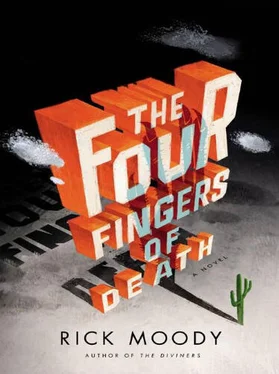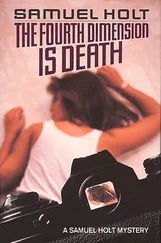An arm. A human arm. An awfully hairy arm, the arm of a really hairy guy, some guy with really unflattering, bristly black hair up and down his arm. The arm was severed at the elbow, or just below, and a bit of bone protruded from the end, as if to remind Rafferty that there had once been even more at the other end of the thing. Oddly enough, meanwhile, the hand at the end of the arm was missing a finger. Not from impact, he suspected, because the missing finger had healed over. The middle finger. This simian guy from space had been missing a finger for a while. And the fourth finger had a ring, a standard-issue gold band. White gold, Rafferty surmised, because he knew his precious metals. Rafferty began broadcasting the light from his deluxe flashlight, looking for other pieces of the body that he now associated with the Mars mission. But he could see nothing else, not in this cursory examination.
A pivotal and reckless idea then came to him rather suddenly, and that was the idea that he might take the arm. Before the military arrived. It would go well with some animal trophies he kept, for example, and it would be an indisputable conversation starter if, someday, he felt he could allow it out into the light. Maybe it was the chemical reagents talking, but he liked the idea of having the arm, having the souvenir. Or maybe the decision was much more primitive than this. Maybe it was just that the arm was so rich with implications. Maybe it somehow seduced him into caring for it. Whatever the particulars of this decision, Rafferty managed to wrap the arm in an old advertising circular from the Rio Blanco free paper, and set it on the passenger seat in the cab of his truck.
He was still standing there, looking neighborly, when the fire trucks arrived on the scene.
Of great interest to epidemiologists and medical historians later was this question: How much could the severed limb know on its own? Sundered from its nerve center, in much the way that the ERV was sundered from NASA at the crucial moment of its own descent, in much the way that the Earth, that orbiting hunk of cosmic rock, was flung off from the maelstrom of gases and clouds that formed the universe, the arm was no longer in possession of the story of its origin. It didn’t know where it was, it didn’t know what it was, it didn’t know when it had known these things, if ever. The arm could smell nothing, taste nothing, see nothing, hear nothing. It had no concrete memory of what these other senses, with which it once acted in concert, did. It would be easy to compile a list of negations as to the skills and abilities of the severed arm. It would be easy to forecast what it could not or would not be able to do, without brain or blood supply. But that would be to overlook evidence of its unsettling accomplishments.
Historical accounts suggest that in fact the arm, the hand, the thing , to give it the name that people who stumbled on it gave it under most circumstances, had, despite appearances, a reservoir of desire. The arm, and the hand connected to it, had muscular recall, and the muscular recall was of certain kinds of activities once performed routinely, such as grasping, releasing, drumming fingers, snapping fingers, practicing pianistic scales, exposing fingernails for cursory examination, shaking of hands, making a thumbs-up gesture, making an A-okay gesture, signing the deaf signing alphabet, clapping, waving, catching objects, throwing objects, caressing objects, depressing buttons, unlatching latches, turning doorknobs, writing things, cleaning the outer part of the ear canal, picking the nose, scratching the posterior, pouring things, picking up silverware, cracking knuckles, and so forth. These muscle memories are too many and varied to list beyond this partial catalogue, but they were all there, and the arm knew how to perform them, and more than knowing how to perform these muscle memories, the arm delighted in performing them; it lived (after a fashion) to perform them, especially now in the twilight of its being, and thus, whereas a conventionally severed arm, a severed arm in the limited bioethical atmosphere of the planet Earth, is known to do nothing at all (it may flop for a couple of seconds before coming to rest), the severed arm from Mars, the one infected with a certain pathogen, continued to experience its muscle memory, and experienced an almost frenzied need to act in the dreamy thrall of these memories. This is a kind of desire. The arm longed, that is, for its past, for a time of action, when it had more opportunities. In an absence of stimulus, it began to run through many of its former activities, trying to find something, some way out, some other way of being. Anything but dormancy.
People have said that the arm knew what it was doing when it began its destructive spree, but these people were and are wrong, because the arm was just an arm, and an arm, no matter how animated with a space-borne pathogen, cannot be a brain. And yet despite its uncertainty about what it was doing, it still had an agenda, and that agenda involved making use of its range of motion in order to express its catalogue of memories. Sometimes this longing was so intense, so excruciating, that it was intolerable for the arm. Or that is the theory. Other times, fresh from some recent activity, the arm, exhausted perhaps, rested, becoming to the casual eye a severed arm of the routine sort.
Because the arm could not tell specifically what happened in most cases when it was left alone with various persons, it is impossible to re-create beyond reasonable doubt what took place in these instances. Except under circumstances where a person was involved briefly with the arm and managed to escape to alert others, there is little information. In the case of the miner called Bix Rafferty, there were no witnesses. And yet in all likelihood, we can ascertain the outline of the story. Rafferty, after his encounter with the military at the ERV debris site, climbed into the cab of his truck. Of the dialogue just preceding this moment, as given by the personnel from the base, we have highlights. The military personnel indicated to Rafferty that the spot where he was parked was now going to be redesignated a completely secure possession of the federal government of the United States, and that his lease from the Bureau of Land Management would be subject to review. This area, he was told, was no longer safe. He needed to evacuate to a perimeter of at least three miles. When the preliminary cleanup was completed by the Hazmat-suited military professionals, Rafferty would be contacted, and a thorough discussion of the value of his business would be undertaken. In the meantime, Rafferty needed to evacuate. Oh, and he was asked by a certain captain who was present there whether he had found anything at the site that was of interest to him. Would he please, at this juncture, return the item or items.
The implication was twofold. On the one hand, this was a heavily armed (with uranium-tipped explosives and armor-piercing bullets, Tasers, proton disrupters, and every other kind of infernal killing device) military detachment that was not to be trifled with; on the other hand, the captain and Rafferty had achieved an understanding. The substance of the understanding was that the federal rules did not apply. The ability of the government to enforce its dictates was understood to be limited. The government could threaten. But in the desert a certain casual feeling about the rule of law was the law, and order was best maintained through a system of mutual interdependencies, these being based upon a seesawing of trust, distrust, and money.
Rafferty, understanding the request, immediately hauled one of the computer chassis out of the back of his truck, set it at the feet of the captain, and remarked that he’d kind of been hoping “to put the thing on the wall” in his trailer. Some busted-down private shone a lamplight in the truck and plucked out some wiring. The men then had a laugh, before the captain reminded Rafferty that he had been ordered to evacuate and that this order was serious, given “the nature of what we’re dealing with.”
Читать дальше












